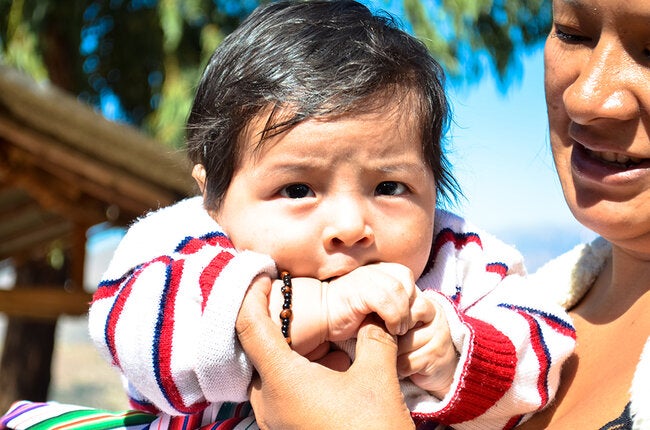The country's hepatitis B elimination strategy includes testing and treatment for pregnant women and vaccination of newborns within the first 24 hours.
Yenny Antonio Leon is a 25-year-old mother from Huanta, Ayacucho, Peru, who was diagnosed with hepatitis B before having her baby. "When I found out, I felt terrible because I thought it was a fatal disease," she recalls. Her biggest concern, however, was the possibility of transmitting the disease to her baby. But she followed all her doctor's recommendations to the letter.
Hepatitis B is an inflammation of the liver caused by a virus that is transmitted through contact with infected blood or other body fluids. Hepatitis B can be transmitted sexually and from mother to child during birth. Between 5% and 10% of infected people develop a chronic form of the disease, and after a number of years develop complications such as cirrhosis or liver cancer. An estimated 2.8 million people in the Region of the Americas are living with hepatitis B.
Liam Sebastian, Yenny's son—now 15 months old—received hepatitis B vaccine after birth as well as immunoglobulin, which is recommended in cases where the mother tests positive. As a result, Liam has so far tested negative for the disease.
In this Andean country, reporting of hepatitis B cases is mandatory and prevention is based on universal vaccination, which can prevent infection in 95 % of cases. In 2014, more than 100,000 people were tested for the disease, of whom 468 were diagnosed with chronic infection.
The largest concentration of cases in Peru are found in areas along the eastern slope of the Andes (Ayacucho) and in the Amazon Basin (Loreto). Indigenous people living in the Amazon are particularly vulnerable to hepatitis B due to geographical and cultural barriers that decrease their access to health care and preventive interventions.
To ensure further progress toward the elimination of hepatitis B, Peru's Ministry of Health has stepped up vaccination campaigns and diagnostic testing.
Carlos Benites Villafane, coordinator of the National Strategy for Prevention and Control of STIs, HIV/AIDS and Hepatitis B in the Ministry of Health, says the most important preventive measures after newborn vaccination are regular check-ups of pregnant women and monitoring of newborns after birth. "During 2014, 26 newborns exposed to hepatitis B were reported and received vaccine and immunoglobulin, and not one has tested positive for the disease," he said.
According to Benites, the national plan seeks to eliminate mother-to-child transmission of the disease over the next five years through targeted intervention focused on areas with the highest number of reported cases. Peru has has worked to strengthen its health information system and to identify the best strategies to address the problem.
Peru's experience is a good practice that we can share with other countries in the Region and the world
Benites emphasizes that the most important strategy is universal vaccination against hepatitis B, especially for newborns during the first 24 hours of life. Testing for hepatitis B is recommended as part of the prenatal care package for all pregnant women. When hepatitis B is detected in a mother-to-be, her need for antiviral treatment is evaluated. Health professionals also perform clinical monitoring of newborns of mothers with hepatitis.
The Pan American Health Organization (PAHO) is working with the countries of the Americas to learn more about the situation of hepatitis and to carry out actions to prevent and treat it. "Peru's experience is a good practice that we can share with other countries in the Region and the world," says Massimo Ghidinelli, head of PAHO's HIV, Hepatitis, Tuberculosis, and Sexually Transmitted Infections (HT) program.
Eliminating perinatal transmission of hepatitis B by 2030 "is possible if we evaluate pregnant women and vaccinate all newborns in the first 24 hours," he adds.
Yenny says she has overcome the fear she felt when she was first diagnosed, and she now advises pregnant women and other patients with hepatitis not to be afraid, to eat a healthy diet and to keep all their medical appointments. Today, both mother and baby are doing fine.
Links



